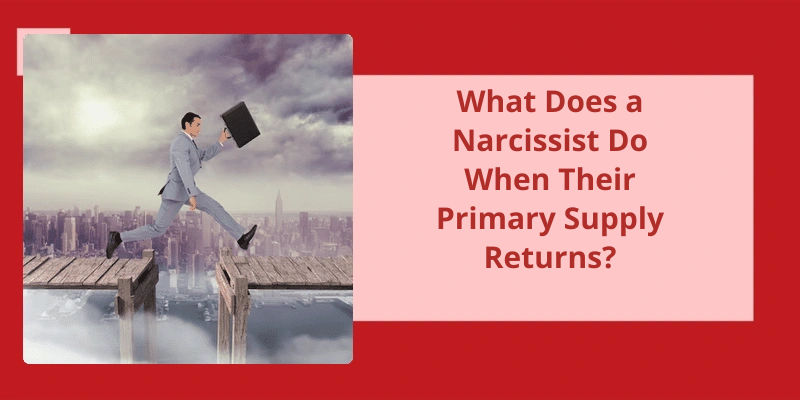However, when their primary supply returns after a period of absence, the narcissist's behavior can shift in a number of different ways. Some may become more aggressive and controlling, while others may attempt to win their supply back with charm and false affection. Ultimately, the narcissist's behavior in response to their primary supply's return can provide insight into their true motivations and emotional state, and can help inform decisions about how to deal with the individual going forward.
Do Narcissists Discard When Their Supply Is Exhausted?
Narcissists are notorious for their insatiable need for validation and attention from others. They thrive on the adulation of their fans and followers, and they’ll go to great lengths to maintain their place at the center of attention. However, once a supply source has been exhausted, meaning they’ve given all of themselves to the narcissist, they then become expendable and disposable.
At first, the narcissist will try to reignite the flame that once kept the supply source engaged and committed to them. They may use various tactics such as love bombing, guilt-tripping, or even threats to try and get their way. However, if the supply source remains unresponsive or becomes too demanding, the narcissist will gradually start to withdraw their attention and affection.
Ultimately, once the supply source has been stripped of all it’s value and usefulness, the narcissist will discard it without a second thought. They’ll move on to the next source of validation and adulation, leaving behind a trail of destruction and heartache.
However, it’s important to note that not all narcissists are equal. Statistically speaking, about 5% of the population meet the criteria for narcissistic personality disorder, while another 10% to 15% exhibit tendencies consistent with the disorder. So, while many people may display narcissistic behaviors from time to time, not all of them will exhibit the same levels of cruelty and callousness when it comes to their supply sources.
The answer to whether narcissists discard their supply when exhausted is a resounding yes. Regardless, anyone who’s been subjected to a narcissists emotional abuse would do well to cut ties with them and seek therapy to heal from the trauma.
Understanding how a narcissist treats their primary supply is crucial to recognizing their toxic behavior. Apart from their initial love bombing, the devaluation and eventual discarding of their primary supply can cause significant emotional and psychological harm. In this article, we will delve deeper into the various ways that a narcissist may treat their primary source and the impact it can have on the victim.
How Does a Narcissist Treat His Primary Supply?
This can be incredibly hurtful and confusing for the primary supply, who may have believed the relationship was genuine and meaningful. It’s important to understand that this behavior isn’t a reflection of the primary supplys worth or value as a person, but rather of the narcissists distorted view of relationships and their constant need for validation and attention.
In the early stages of the relationship, the narcissist may idealize their primary supply and shower them with attention, affection, and gifts. This is known as love bombing, and it’s a way for the narcissist to gain control and dependence from the primary supply. However, once the narcissist feels secure in the relationship, they may begin to slowly devalue the primary supply and set impossible expectations for them to meet.
The primary supply may feel as though they’re walking on eggshells, constantly trying to please the narcissist and avoid their wrath. The narcissist may use various manipulation tactics such as gaslighting, blame-shifting, and projecting to make the primary supply doubt their own reality and feel responsible for the problems in the relationship. This can lead to feelings of anxiety, depression, and low self-esteem in the primary supply.
It’s important for primary supplies of narcissists to seek support from trusted friends, family, or professionals to help them heal from the emotional abuse and trauma. They may also benefit from setting boundaries, limiting contact with the narcissist, and focusing on their own self-care and growth. It’s important to remember that the narcissists behavior isn’t their fault and they deserve to be treated with respect and kindness.
Source: How does a narcissist treat their primary supply (wife) after …






